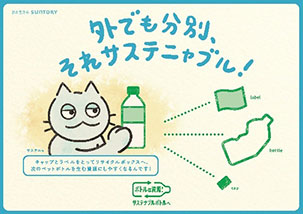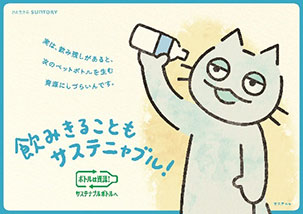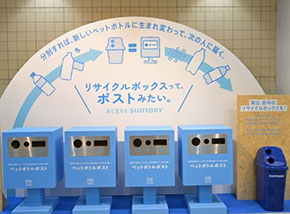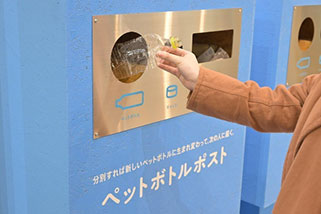Environment
Packaging & Resource Efficiency
Policies and Our Approach
To build a recycling-oriented society, Suntory Beverage & Food (“the Company”) will promote problem-solving efforts together with various stakeholders. Each employee will work on taking responsible action to solve problems and take the initiative in bringing about a sustainable society.
Containers and packaging protect and preserve the quality of products until they reach customers. However, most end up becoming post-consumer waste. The Suntory Group, which includes Suntory Beverage & Food, recognizes the social and environmental impacts that containers and packaging cause and, in 1997, established Guidelines for the Environmental Design of Containers and Packaging. Designs are done in accordance with the Guidelines, for instance, by selecting material for labels and the color of glass bottles in consideration of recyclability. In addition, the Group engages in Life Cycle Assessment (LCA) efforts to reduce the environmental impact of containers and packaging.
3Rs of Containers and Packaging
The Suntory Group works to develop containers and packaging that give consideration to the environment, based on the 3Rs of “Reduce, Reuse, and Recycle.” We work on reducing the weight, using materials with less environmental impact, and designing packaging that is easy to recycle, while taking into consideration usability from the time customers drink the product to the time it is recycled. We also work in collaboration with various recycling organizations and local governments to promote recycling.
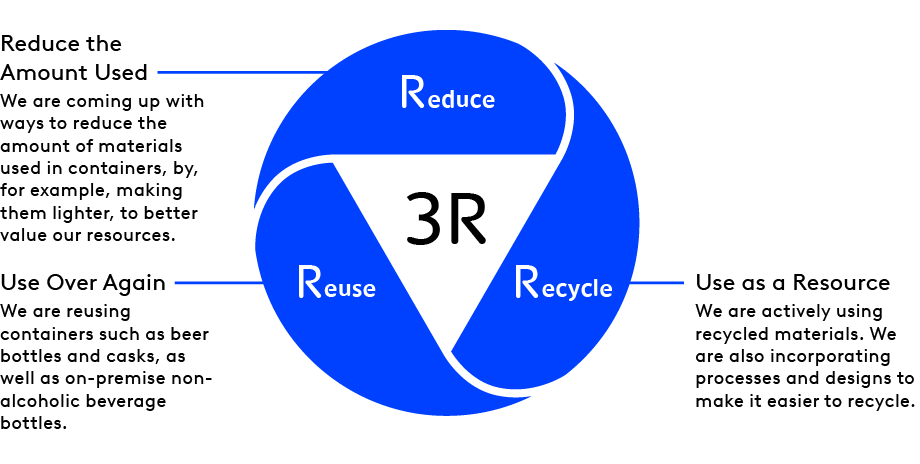
Suntory Group Plastic Policy
Based on this Plastic Policy, Suntory will aim for fully sustainable plastic bottles in all the PET bottles used globally by 2030.
Plastic products have enriched people’s lives with their usefulness. On the other hand, the environmental impact caused by improper handling of used plastics has become a social problem. In Japan, the Ministry of the Environment has formulated the Plastic Resource Recycling Strategy to comprehensively promote resource recycling while recognizing the convenience of plastic products. The Suntory Group, which includes Suntory Beverage & Food, formulated its own Plastic Policy in 2019 in order to strongly lead the transformation to a recycling-oriented and decarbonized society. Based on this policy, the Group aims to switch all the PET bottles used globally for its products to bottles made of recycled or plant-based material by 2030, achieving zero use of virgin petroleum-based materials.
Suntory Group Plastic Policy
Expressing gratitude toward the Blessings of Nature that are the source of Suntory’s products, the Suntory Group will provide strong leadership for transforming into a recycling-oriented and zero carbon society to bring about a world where diverse animal and plant life shines and resonates. With its diversity in usage and convenience, plastic has made our lives easier.
The plastic containers and packaging we use serve a useful function, but to prevent them from having a negative impact on the global environment, we will promote problem-solving efforts together with various stakeholders. Each employee of Suntory will work on taking responsible action to solve problems and take the initiative in bringing about a sustainable society.
- Recycle & Renewable:
- Aim to switch all the PET bottles used globally for Suntory products to be made of recycled or plant-based material by 2030, achieving zero use of virgin petroleum-based materials.
- Actively work and collaborate with government agencies, industry, environmental non-governmental and non-profit organizations for the measures necessary to develop an efficient recycling system based on the situation of each country where we do business.
- Reduce & Replacement:
Reduce the amount of plastic used by changing the design of containers and packaging and look for the introduction of alternative containers that do not negatively impact the environment in order to effectively utilize resources. - Innovation:
Actively invest in innovation for materials and processes that improve the recycling rate and minimize environmental impact. - New Behavior:
Promote activities that drive change in consumer behavior. Each Suntory employee will work to change their lifestyle, promote sorting and collection, and actively participate in social contribution activities such as cleaning up rivers and beaches.
2R+B Strategy for PET Bottles
In regards to PET bottle containers, we are taking action based on the 2R+B (Reduce/Recycle + Bio) strategy, which is unique to Suntory. The concept is to replace fossil-fuel-derived materials with renewable materials to the extent possible, while reducing the use of resin and using recycled materials in development to achieve thorough and effective use of resources.

Implementation Structure
Environmental Management Structure
The Sustainability Committee, an advisory body for the Board of Directors, creates sustainability management strategies, drives related initiatives, and confirms progress on seven themes — water, greenhouse gases, containers and packaging, raw ingredients, health, human rights, and enriching life.
Suntory Beverage & Food’s sustainability management promotion organization
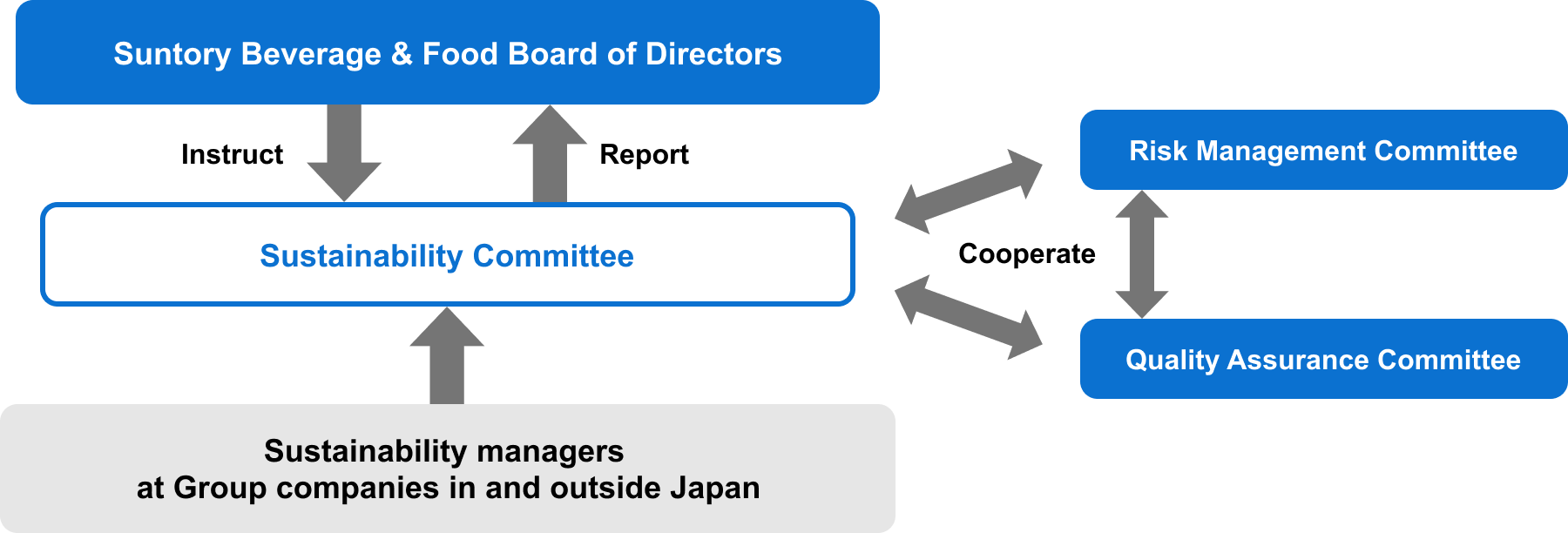
For more information on the Sustainability Committee, see Environmental Management
Targets and Progress
Resource / Raw Material Reduction Targets
Percentage of Sustainable Materials Used in PET Bottles*
Targets
Toward
2030
- Switch all the PET bottles used globally to be made of recycled or plant-based material by 2030, achieving zero use of virgin petroleum-based materials.
2023
Progress
- Percentage of PET bottles made of recycled or plant-based material: 33%
- Japan
- 53%*
- Overseas
- 18%
-
*Ratio of the number of 100% sustainable bottle
Our Initiatives

Reduce: Lightweighting
Suntory Beverage & Food uses 550mL PET bottles for Suntory Tennensui mineral water that it independently developed to be the lightest* (11.9g) in Japan (excluding PET bottles for use in vending machines). We have reduced the amount of raw materials derived from petroleum by 40% for each 550 mL bottle compared to conventional bottles (13.5g). Moreover, we have reduced the weight of our 2L PET bottles to 29.8g by about 20% per bottle compared to conventional bottles (36.2g), making this the first 2L PET bottle in Japan to weigh less than 30g.
-
*Plastic bottles for mineral water (500mL to 600mL) in Japan. As of November 2020
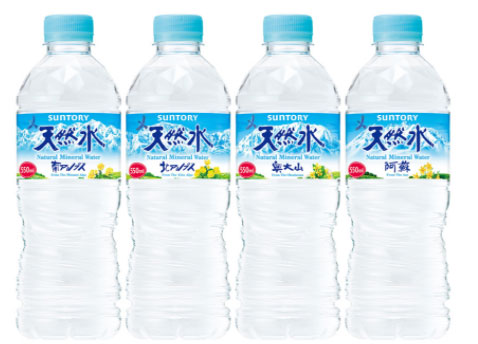
Change in Weight of 550-mL Suntory Tennensui PET Bottles*1

-
*1500-mL capacity through 2009
Change in Weight of 2-L Suntory Tennensui PET Bottles

Introducing Record Breaking Thinnest Roll Label*1 for Plastic Bottle Beverages in Japan
We are reducing the weight of product labels on plastic bottles to reduce environmental impact. We commercialized the thinnest plastic bottle roll label in Japan at 16㎛ (micrometer*2) in 2012. In April 2014, we introduced an even thinner label for the 2L and 550mL PET bottles used for Suntory Tennensui mineral water which was only 12㎛ thick. Since then, we have been expanding its adoption to all of our products that use roll labels. This has allowed us to reduce CO2 emissions by 25%*3 compared to conventional labels (16㎛).
-
*1Labels that peel off from the glued area instead of peeling off at the perforations
-
*21/1,000mm
-
*3Reduction rate in the film (label) manufacturing process
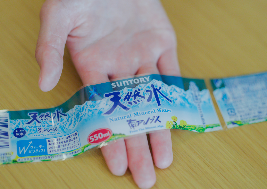
12㎛ thick role label, thinnest in Japan
The Lightest Cap of Any PET Beverage Bottle in Japan
We are also reducing the environmental impact of the bottle caps on plastic bottles. Since September 2016, we have adopted 1.85g bottle caps, which are the lightest in Japan*1 that use 30% bio-based PET materials for Suntory Minami-Alps Tennensui mineral water. This innovation reduces the use of petroleum-derived raw materials by 35% and decreases CO2 emissions by 27% compared to conventional PET bottle caps.
In addition, we have further evolved our environmental efforts by using bio-based materials and in March 2019, we introduced polyethylene caps with 100% plant-derived ethylene*2 for 550ml Suntory Aso Tennensui mineral water, which is manufactured at our Kyushu Kumamoto Plant (Kamimashiki District, Kumamoto Prefecture). This innovation reduces the use of petroleum-derived raw materials by 90% and decreases CO2 emissions by 56%*3 compared to current PET bottle caps.
-
*1As of April 2023
-
*2Polyethylene caps with 100% plant-derived ethylene as the main raw material. Excluding trace amounts of petroleum-derived components and colorant components at the time of production line changeover.
-
*3One bottle of Suntory Tennensui Mineral Water (550mL)
Changes in Weight Reduction for Our Major PET Bottled Products in the Japanese Market
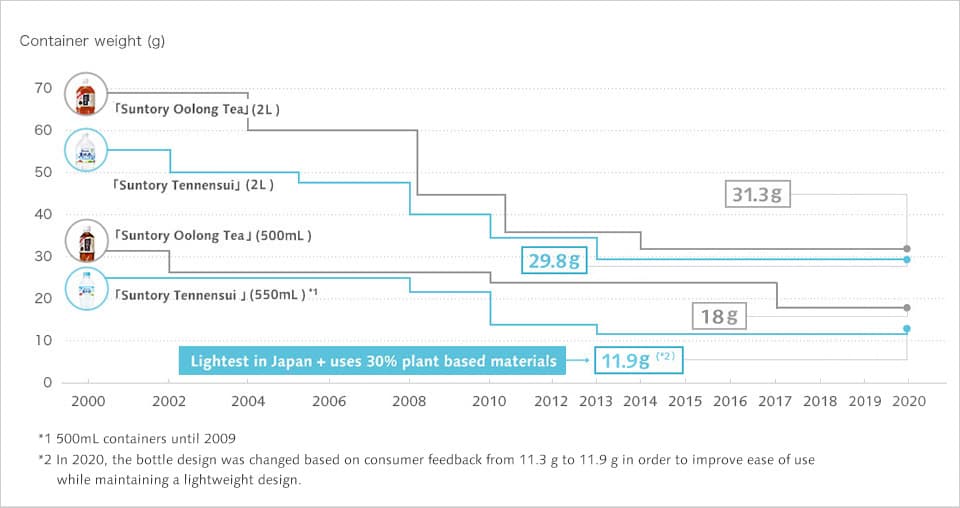
Example of CO2 Emissions Reduction for Signature Product (Suntory Tennensui mineral water 2L PET bottle)
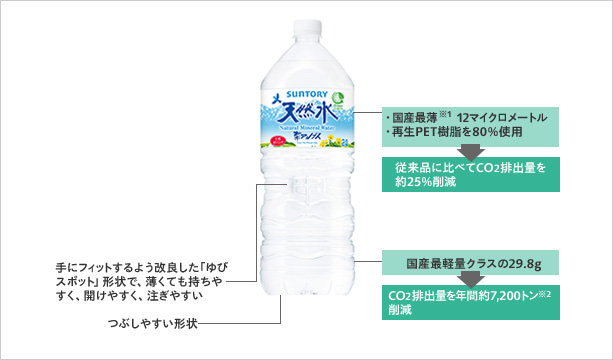
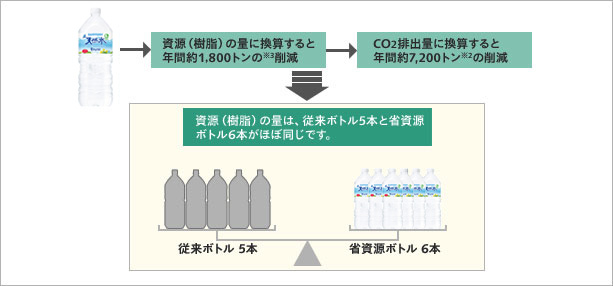
-
*1As of April 2019
-
*2, 3Based on our calculations
Development of World’s Lightest* Heat-resistant PET Bottle in Southeast Asia Leveraging Japanese Technological Capabilities
The Japanese manufacturing technology and design capabilities for reducing weight of PET bottles have been used in Group companies in Europe and Asia. In 2020, we succeeded in developing the world’s lightest* PET bottle weighing 15 g in heat-resistant filled containers that also pursue functionality, versatility, and design. This heat-resistant PET bottle utilizes technology that prevents deformation of the bottle by dropping nitrogen to create positive pressure.
We have introduced this bottle to Suntory PepsiCo Beverage (Thailand) and Suntory PepsiCo Vietnam Beverage (Vietnam). We also have started using 100% recycled materials for these bottles from 2023.
-
*In the 450-mL class of heat-resistant PET bottles (as of April 2023, according to our own research)
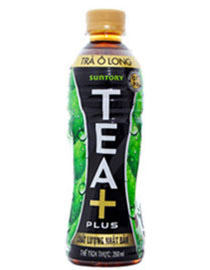
Lightest Heat-Resistant Bottle with Liquid Nitrogen Injection in Southeast Asia

Recycle: “Bottle to Bottle” Horizontal Recycling
Suntory Beverage & Food engages in “bottle to bottle” horizontal recycling, where used PET bottles are turned into new ones. Starting with introducing the Japanese soft drink industry’s first PET bottles using 100% recycled materials in 2012, we have continued to advance “bottle to bottle” horizontal recycling, including development of the world's first F-to-P direct recycling technology, which has lower CO2 emissions compared with conventional recycling methods.
Initiatives in Japan
“Bottle to Bottle” Horizontal Recycling
“Bottle to bottle” horizontal recycling refers to recycling used PET bottles into new ones. PET bottles are resources that can be recycled many times, which can help reduce the use of fossil-fuel-derived materials and CO2 emissions. “Bottle to bottle” horizontal recycling through mechanical recycling* is the recycling method with the least environmental impact (CO2 emissions in processes from raw materials procurement to PET preform production). In 2011, Suntory was the first company in the Japanese beverage industry to establish this technology, and has continued promoting “bottle to bottle” horizontal recycling since then.
-
*Mechanical recycling: A method in which recycled resin obtained by material recycling (used products are processed by crushing, washing, and made into raw materials for products again) is further processed under high temperature and reduced pressure for a certain period of time to remove impurities in the recycled material and make PET resin of suitable quality for beverage containers.

Changes in Initiative to Use 100% Sustainable PET Bottles
Suntory Beverage & Food has been working with partner companies for more than ten years to recycle used PET bottles into new beverage PET bottles as it leads the industry towards bringing about a sustainable society. In 2011, together with Kyoei Sangyo Co., Ltd., we built the first bottle-to-bottle mechanical recycling system for PET bottles in Japan. And in 2012, starting with the adoption of the first PET bottle used by the beverage industry in Japan made from 100% recycled materials*1, we embarked on efforts such as developing the world's first F-to-P direct recycling technology*2 to reduce CO2 emissions even further than existing methods. Though efforts such as these, we have advanced technological innovation and actively commercialized and promoted bottle-to-bottle horizontal recycling for many years.
The Suntory Group Plastic Policy, which was formulated in 2019, sets the goal of making use of 100% sustainable bottles by 2030 by using only recycled or plant-based material for all of its PET bottles globally by that year and eliminating the use of virgin petroleum-based materials. We are engaging in various efforts to achieve this. In 2022, the percentage of our PET bottles made from 100% sustainable materials (100% recycled or plant-based materials) rose to 46% of the total weight of PET bottles used in Japan. In 2023, we aim for 50% or more by actively promoting bottle-to-bottle horizontal recycling, and utilization of plant-derived materials.
-
*1Through mechanical recycling
-
*2Abbreviation of “Flake to Preform.” Developed in collaboration with Kyoei Sangyo Co., Ltd. and other three companies
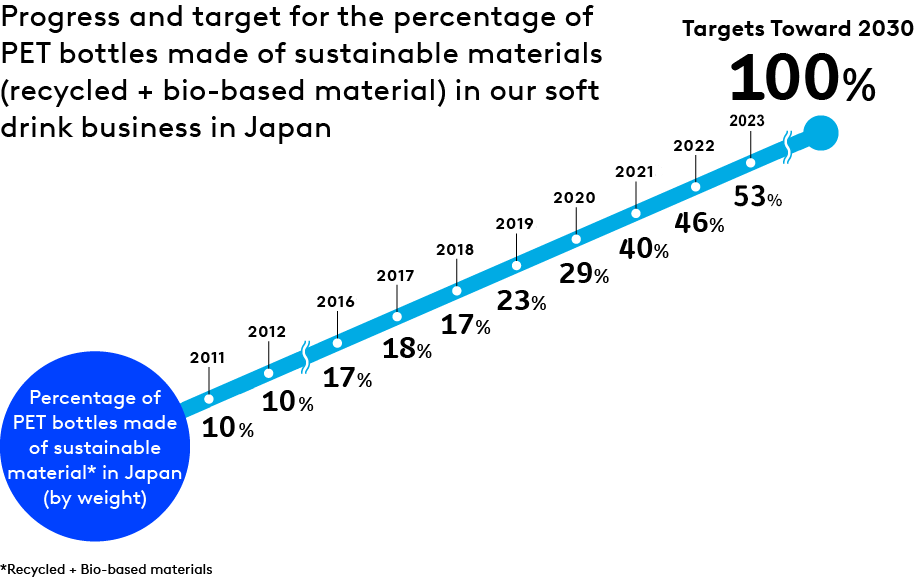
Promote horizontal recycling in collaboration with businesses and local governments
As we strive to bring about a recycling-oriented society, we are working in collaboration with businesses and local governments to recycle used PET bottles into new PET bottles through bottle-to-bottle horizontal recycling.
We have made agreements concerning horizontal recycling with retailers, commercial facilities, and the like. We recycle used PET bottles collected in places like store fronts into PET bottles for our company's beverages using bottle-to-bottle horizontal recycling. At the same time, we hold events aimed at educating consumers.
By making similar agreements with local governments, we now are recycling PET bottles, previously being discarded by residents, as resources for PET bottles for Suntory beverages. We also conduct educational classes about PET bottle recycling at elementary and junior high schools in the municipalities with which we have agreements.
Developing Bottle-to-Bottle Horizontal Recycling
In 2011, together with Kyoei Sangyo Co., Ltd., Suntory Beverage & Food built the first bottle-to-bottle mechanical recycling system*1 for PET bottles in Japan. In 2012, we released a joint research paper*2 on evaluating the safety of recycled PET bottles.
This system received Commendation for Contributors to the Development of a Recycling-oriented Society in 2011 and 2012, and Commendation for Global Warming Prevention (Technological Development and Commercialization Category) in 2011 both from the Minister of the Environment, and Nikkei Global Environmental Technology Excellence Award in 2011 for the first time in the food industry. We also received the 21st Global Environment Award in 2012 and Environmental Excellence Award hosted by the Hitachi Environment Foundation and Nikkan Kogyo Shimbun, Ltd. in 2013.

The mechanical recycling system has the highest cost efficiency and lowest environmental impact*3 (CO2 emissions from raw material procurement to preform manufacturing) among PET bottle recycling systems adopted in Japan as of April, 2023. The recycling process adds color to the bottles, but there is no problem with their quality or safety as containers.
-
*1Mechanical recycling: A method in which recycled resin obtained by material recycling (used products are processed by crushing, washing, and made into raw materials for products again) is further processed under high temperature and reduced pressure for a certain period of time to remove impurities in the recycled material and make PET resin of suitable quality for beverage containers.
-
*2Japanese Journal of Food Chemistry and Safety 19 (1), 7-13, 2012
-
*3Based on our research
Adoption of F-to-P direct recycling technology
In 2017, as part of our recycling efforts, we collaborated with Kyoei Sangyo Co., Ltd. and overseas machinery manufacturers (EREMA in Austria and SIPA in Italy) to develop F-to-P direct recycling technology which is expected to further reduce environmental impact. We began production in the fall of 2018. F-to-P direct recycling technology is a technology that can directly manufacture preforms after melting and filtering flakes made from collected PET bottles that have been crushed and washed at high temperatures. The F-to-P direct recycling technology can reduce CO2emissions by 70%* compared to virgin PET bottles. (Current mechanical recycle can reduce CO2 emissions by 60%.* )
-
*Processes from used PET bottles to the preform production.
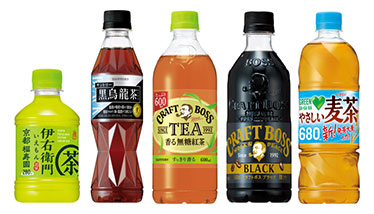
Products that use F-to-P direct recycling technology
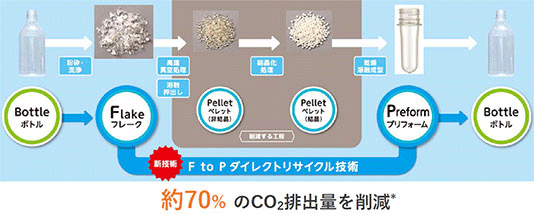
-
*Approx. 70% reduction in CO2 emissions
-
*Compared to use of virgin petroleum-based materials
Proactive Introduction of Recycled PET Bottles
The Suntory Group is promoting the adoption of recycled materials as part of its efforts to meet its goal of making its PET bottle use 100% sustainable by 2030. The Group adopted PET bottles made from 100% recycled materials for all bottles of GREEN DAKARA Yasashii Mugicha (680mL, 600mL) sold in Japan, as well as many products, including Craft Boss and Iyemon. It also adopted a new logo mark to convey that PET bottles can be recycled numerous times: "Bottles are Resources! Towards a Sustainable Bottle." The Group has rolled out this mark to all PET bottles to expand communication with consumers. It is also moving to use of PET bottles made from 100% recycled materials for products other than soft drinks sold in Japan, such as 720mL PET bottles used in its domestic wine business. Going forward, we will accelerate these efforts across all of its operations.
-
*New logo, “Bottles are resources! Towards a Sustainable Bottle”
-
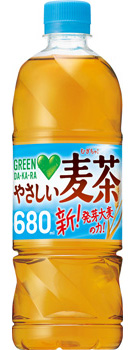
Yasashii Mugicha 680mL
-
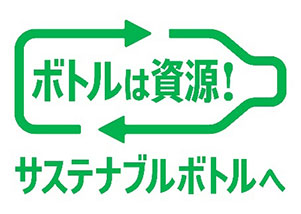
New logo, “Bottles are resources! Towards a Sustainable Bottle”
Promoting Bottle-to-Bottle Horizontal Recycling by Improving Containers and Packaging
Label-free PET bottle products do away with the plastic labels affixed to conventional PET bottles. This allows consumers to conveniently enjoy the product without the hassle of having to removing the label before recycling. We believe that this will make it easy for customers to separate bottles for recycling, and promote the recycling of used PET bottles into new PET bottles through bottle-to-bottle horizontal recycling. We introduced label-free products in 2020, and have expanded the use of label-free bottles to mainstay products such as Suntory Tennensui mineral water, Craft Boss, and Iyemon.
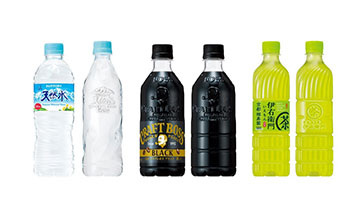
In April 2023, we introduce a new 2L PET bottle for our Suntory Tennensui mineral water that has been designed to be collapsible to 1/6th of its regular size when empty. This new container resolves complaints from consumers about bottles after they had finished drinking the product at home, such as "the bottles pop back into shape even after I squash them," and "they take up space in the house until trash day." At the same time, encouraging consumers to find fun in sorting and removing the caps and labels of PET bottles, we believe that this helps increase the quality of recycling, in turn will help resource recycling.
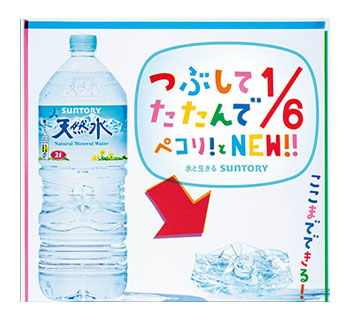
Expanding Horizontal Recycling Awareness-raising Activities
Suntory Beverage & Food has worked to bring about a sustainable society by promoting sorted collection of recyclables and understanding of recycling initiatives through efforts such as external seminars. In 2021, the Company signed an Agreement on the Realization of a Resource Recycling-Oriented Society with Waseda University, and it is implementing initiatives for the next generation. We also conduct educational classes about the significance of promoting bottle-to-bottle horizontal recycling and sorting PET bottles at elementary and junior high schools in the municipalities with which we have agreements related to bottle-to-bottle horizontal recycling of PET bottles. These provide an opportunities to think about recycling and resource recycling. Similarly, we hold educational events and seminars for employees and their families at the businesses with which we have made such agreements.
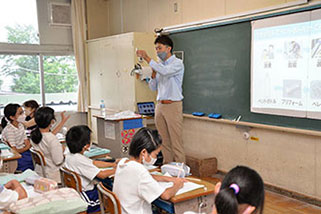
Communication with Consumers
Starting in 2022, we have released a series of digital videos entitled "That's actually sustainable," using a cat cartoon character (Sustainya) to highlight simple, ordinary things that people do without even thinking, which are in fact sustainable practices. We are also proactively communicating with consumers and raising awareness for sustainability in other ways, including holding “PET bottle post” events based on the concept of having as many people as possible think of PET bottles not as garbage but as a resource, and of recycling bins not as garbage bins but as something more like postal boxes that “deliver” the resource to the next person.
That's actually sustainable.
Plastic bottle post
Promoting Horizontal Recycling Through Industry Cooperation
Starting in the fall of 2022, we have begun gradually rolling out recycling bins with industry-standard specifications in outdoor areas where there is a lot of contamination. New recycling boxes with innovations such as a downward-facing insertion slot have been shown to reduce the amount of foreign matter put into them. This brings improvement of the quality of recycling and contributes to “bottle to bottle” horizontal recycling. Using recycling boxes with industry-standard specifications will improve efficiency for vending machine operators and recycling processes and promote PET bottle resource circularity.
For more details, please see Japan Soft Drink Association website
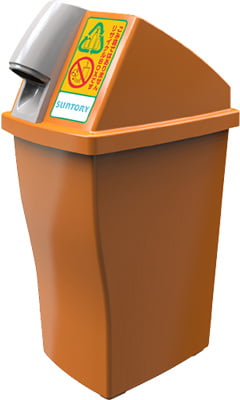
Initiatives outside Japan
Introduction of Recycled PET Bottles at Overseas Locations
To achieve the 2030 fully sustainable PET bottle goal, Suntory Beverage & Food Europe aims to achieve 50% recycled contents in its PET bottles by 2025 or sooner.
Suntory Beverage & Food Europe brand Ribena was the first soft drinks brand in the UK to use a 100% PET bottle made from recycled plastic in 2007.The company has been increasing its use of recycled plastic - in 2021 this included the introduction of 100% recycled PET in May Tea and Pulco in France. In 2022, Suntory Beverage & Food Europe has started 100% recycled PET bottles in its Lucozade Sport brand in the UK and Ireland.
Suntory Beverage & Food Asia Pacific, with its main operations in Vietnam and Thailand, is also strengthening its efforts on recycling and has introduced the company's first 100% recycled PET bottles in Vietnam in 2022.
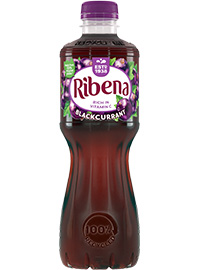
Ribena with 100% sustainable PET bottle
Developing New Technology to Drive Horizontal Recycling
Suntory Beverage & Food Europe is investing in a French green biotech company Carbios' enzymatic PET recycling technology through a consortium with L'Oréal, Nestlé Waters and PepsiCo. Carbios' optimized enzyme breaks down any kind of PET plastic (regardless of color or complexity) into its building blocks, which can then be turned back into like-new, virgin-quality plastic. In June 2021, Carbios produced the world's first food-grade PET plastic bottle prototypes made entirely from enzymatically recycled plastic which was showcased in the company's Orangina brand. In September 2021, Carbios successfully launched a demonstration plant and aims to build an industrial facility by 2025.
* Based on our research

Bio: PET Bottles Using Plant-Based Materials
The Suntory Group, which includes Suntory Beverage & Food, has set a target of switching all products to 100% sustainable PET bottles (made of recycled or plant-based material) by 2030. Prioritizing environment-friendly “bottle to bottle” horizontal recycling, the Group is aiming to achieve PET bottle circularity by repeatedly recycling PET bottles as a resource.
Meanwhile, there are needs in the soft drink industry as a whole to provide new resources to make up for some PET bottles being recycled for other purposes, as well as the growth of the PET bottle beverage market. In response, in addition to “bottle to bottle” horizontal recycling, the Group is also working to develop PET bottles using plant-based material.
In 2013, Suntory Beverage & Food launched a 550ml PET bottle for Suntory Tennensui mineral water that uses 30% plant-based material.* We started releasing a 2L version in April 2023 and have plans for all Suntory Tennensui PET bottles to use plant-based material by the fall of 2023.
-
*Excluding some products for vending machines
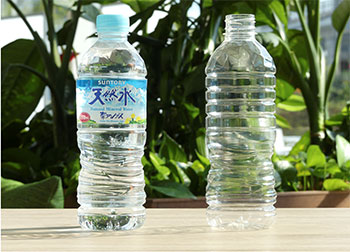
PET bottle using 100% plant-based material (right)
Current PET bottle (using 30% plant-based material) (left)
Suntory Holdings and Anellotech, Inc., a green innovation and technology company in the United States, have worked in a collaborative development of a plastic bottle that uses 100% plant-derived raw materials, and construction has begun in 2016 on a development and testing plant to produce plastic bottle materials in the state of Texas. In the future, we are planning to introduce PET bottles made from 100% plant-based materials for Suntory Tennensui mineral water brand of Suntory Beverage & Food Ltd. In the development process, we aim to produce "paraxylene," a precursor of terephthalic acid which constitutes 70% of PET bottle materials, exclusively from inedible plant-based materials (woodchips) so as not to affect the supply chain of materials for food use.
Adoption of bottle cap that uses 100% bio-based PET materials*1
We are also reducing the environmental impact of the bottle caps on plastic bottles. Since September 2016, we have adopted 1.85g bottle caps, which are the lightest in Japan*2 that use 30% bio-based PET materials for Suntory Minami-Alps Tennensui mineral water. This innovation reduces the use of petroleum-derived raw materials by 35%*3 and decreases CO2 emissions by 27% compared to conventional PET bottle caps.
In addition, we have further evolved our environmental efforts by using bio-based materials and in March 2019, we introduced polyethylene caps with 100% plant-derived ethylene*2 for 550ml Suntory Aso Tennensui mineral water, which is manufactured at our Kyushu Kumamoto Plant (Kamimashiki District, Kumamoto Prefecture). This innovation reduces the use of petroleum-derived raw materials by 90% and decreases CO2 emissions by 56% compared to current PET bottle caps.
-
*1Polyethylene caps with 100% plant-derived ethylene as the main raw material. Excluding trace amounts of petroleum-derived components and colorant components at the time of production line changeover.
-
*2As of April 2023
-
*3One bottle of Suntory Tennensui Mineral Water (550mL)
Cooperation with Stakeholders
Establishment of R Plus Japan to Work on the Recycling of Used Plastics
Suntory Group consists of 12 companies that make up the value chain. To realize a sustainable society and contribute in solving plastic issues, it has jointly established R Plus Japan, a company engaging in resource recycling of used plastics, which started operation from June 2020.April 2023, the number of project collaborators has expanded to 40. Together with Anellotech, R Plus Japan is developing technologies to recycle used plastics.
Many types of plastic apart from PET bottles are reportedly incinerated*1 in Japan at present. This technology alternatively enables plastics including PET bottles to be chemically recycled by directly turning such plastics into base chemicals (benzene, toluene, xylene, ethylene, propylene and other chemicals). It requires fewer treatment processes compared to other chemical recycling methods that require liquefaction and is anticipated to reduce CO2 emissions and energy use. Establishing this technology will allow more used plastic to be recycled efficiently.
R Plus Japan aims to contribute to the solution of the plastics problem, which is common worldwide, through collaboration across industries, in addition to technological development and its implementation in society.
-
*This includes thermal recovery, in which the waste heat generated by incineration is recovered and used to generate electricity and supply heat.
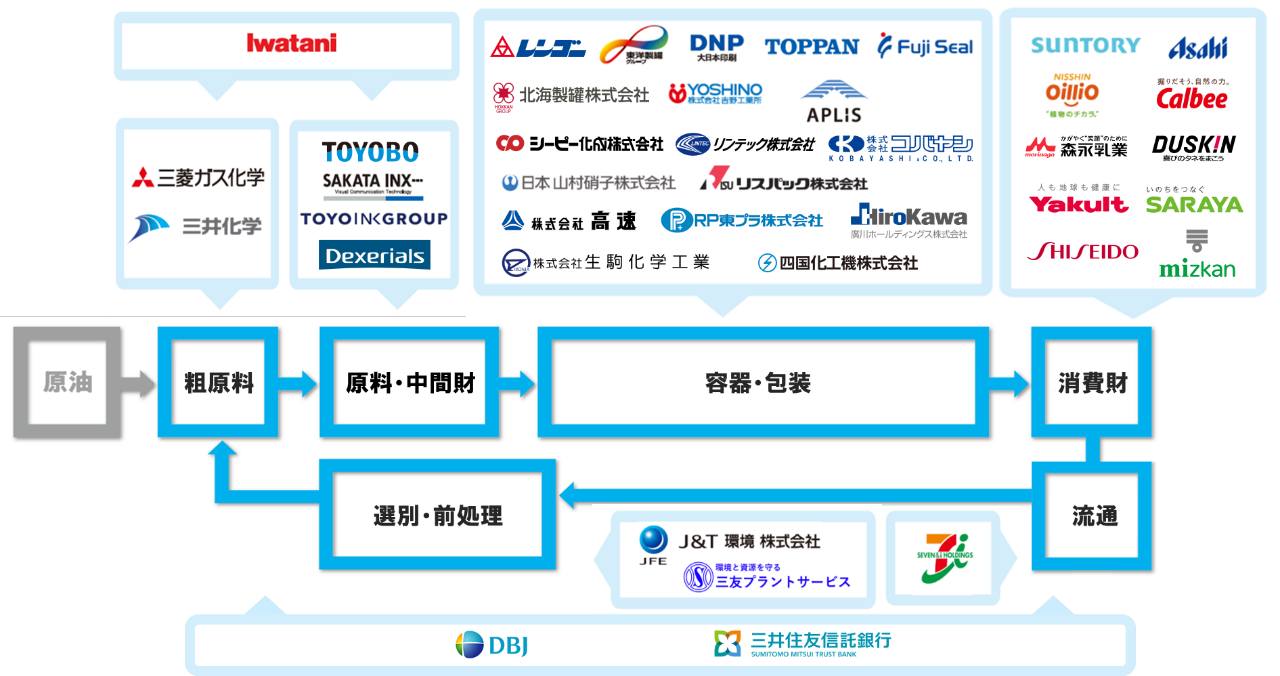
Social Activities
Suntory Beverage & Food employees strive to change their lifestyles, practice sorting and collection, and actively participate in social contribution activities such as cleaning up rivers and beaches. In September 2022, Suntory PepsiCo Vietnam Beverages conducted a beach cleanup near Hanoi, Vietnam in cooperation with Ocean Conservancy, a global marine nature conservation organization, with more than 150 participants, including employees and their families.
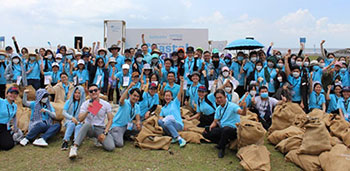
Alliance Membership
Joined the Clean Ocean Materials Alliance (CLOMA)
The Suntory Group, which includes Suntory Beverage & Food, has been a member of CLOMA, a public-private alliance established in January 2019 at the call of the Ministry of Economy, Trade and Industry, since its inception. Through this alliance, we will strongly cooperate with government agencies and industries to develop and promote alternative materials for plastics, and aim to build an efficient recycling system that meets the needs of each country through information dissemination and technical consulting services to overseas countries.
Joined the Global Plastic Action Partnership (GPAP)
In November 2019, the Suntory Group, which includes Suntory Beverage & Food, joined the Global Plastic Action Partnership (GPAP), a global alliance dedicated to solving environmental challenges caused by plastics. The GPAP is a global alliance for a circular economy of plastics, created by a public-private partnership based on the World Economic Forum with the aim of solving environmental challenges caused by plastics. Its members include the governments of the United Kingdom and Canada, as well as a wide range of businesses, investors, experts, NGOs, and other citizen organizations. In addition to exchanging information and sharing best practices at the global level and is engaged in community-based project activities at the local level.
WWF Japan’s Plastic Circular Challenge 2025
In February 2022, the Suntory Group, which includes Suntory Beverage & Food, joined the Plastic Circular Challenge 2025 organized by WWF Japan (World Wide Fund for Nature Japan) with the aim of realizing a sustainable society. The Plastic Circular Challenge 2025 is a framework for companies to respond to WWF Japan’s call for action to solve the problems of plastics. Participating companies have set a milestone year of 2025 as their commitment to containers and packaging and single-use plastics, and will promote activities based on a “Sustainable Circular Economy” approach.
Other Initiatives
Utilizing LCA to Set Environmental Standards for Containers and Packaging
Containers and packaging protect and preserve the quality of products until they reach customers. However, most become waste after the content is consumed. The Suntory Group, which includes Suntory Beverage & Food, recognizes the social and environmental impacts that containers and packaging cause and, in 1997, established Guidelines for the Environmental Design of Containers and Packaging. Designs are done in accordance with the Guidelines, for instance by selecting material for labels and the color of glass bottles in consideration of recyclability.
Marine Pollution Problem of Plastic Bottles
The problem of marine pollution caused by plastic containers, including plastic bottles, is becoming increasingly serious and is discussed as a global environmental issue. As a beverage company that handles many containers, we are committed to proactively addressing this issue and working with the government, local communities, and industry to resolve it. We have always been promoting 2R+B while expanding activities to raise consumer awareness about recycling.
In the future, we aim to improve the recycling rate even further in each country and region around the world and will encourage activities to promote improvements together with our various stakeholders.
In addition, as part of employee volunteer activities, employees in Japan participate in beach cleanup activity organized by a non-profit organization, while overseas, Suntory Group employees participate in cleanup activities along the Chicago River basin, in an effort to raise awareness so that each and every employee will see this issue as his or her own and take action.
The Suntory Group formulated the Plastic Policy in June 2019 and aims for 100% sustainability by using only recycled or plant-derived materials for all PET bottles used globally by 2030 and achieving zero use of virgin petroleum-based materials.
Efforts to Mold Plastic Bottles In-house
The Suntory Group, which includes Suntory Beverage & Food, is advancing efforts to mold PET bottles in-house by producing PET preform from PET resin, then expanding this into PET bottles. This would make possible consistent design and management of everything from bottle molding through filling, making it easier to make bottles lighter and reduce the amount of resin used.
It would also decrease the amount of fuel used during transport, and the volume of CO2 emissions, compared to procuring completed PET bottles. Moreover, CO2 emissions can be reduced by efficiently utilizing energy through recovery and reuse of the high-pressure air used in PET bottle molding.
-
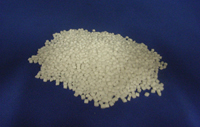
PET Resin
Can reduce CO2 emissions by 50% or more -
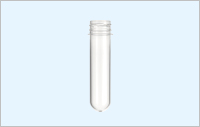
Preform molded from resin
-
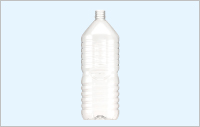
Molded PET bottle
Cans/Bottles/Barrels/Paper Packaging/Cardboard
Reduce: Lightweighting
Lightweighting in Cans
Suntory Beverage & Food is furthering the lightweighting in cans such as those used for coffee by aiming to dramatically reduce the amount of resources that are used while maintaining usability for customers. Steady promotion of even more lightweighting is underway with the introduction of thinner bodies even in steel cans for coffee.

Boss Rainbow Mountain Blend
Reducing the Weight of Cardboard
To reduce environmental impact, we are using short-flap cardboard cartons in cooperation with the industry, beginning with their use for beverages in small PET bottles since the spring of 2012. Through this, we have reduced the use of paper by about 20% compared to conventional cardboard cartons.
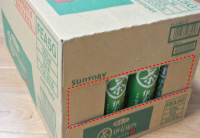
Short-flap cardboard carton with less cardboard used on its sides
Recycle: Promoting Recycling
Achieved 100% Use of FSC®-certified Cardboard
The Suntory Group is gradually adopting paper packaging materials that have acquired the FSC certification*1 that ensures proper management of international forests for products made in Japan. Suntory Beverage & Food introduced FSC-certified cardboard packaging to Suntory Tennensui mineral water for products manufactured from August 2017. Since the end of February 2018, we have achieved 100% use of FSC-certified cardboard used for packaging all our Suntory Tennensui brand products. We are promoting the use of FSC-certified paper packaging materials throughout the Group with the sequential adoption of these materials for Suntory Beverage & Food products and as packaging for six packs.
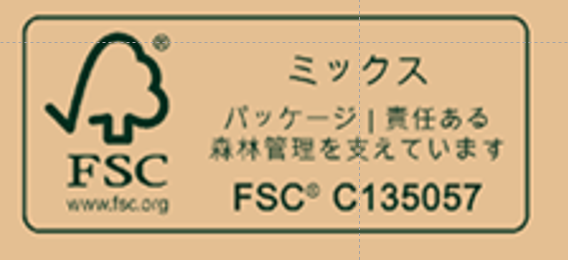
-
*Forest Stewardship Council (FSC) is an international organization that certifies timber produced from forests globally as well as the distribution and manufacturing processes of the cut timber. This certification considers the environmental conservation of these forests and recognizes timber produced in an economical and sustainable manner which generates revenue for the local community. This certification considers the environmental conservation of these forests and recognizes timber produced in an economical and sustainable manner which generates revenue for the local community.
Overview of Waste Management
Promoting Waste Reduction and Recycling
As part of Suntory Beverage & Food's efforts to establish a recycling-oriented society, the Company is working to reduce emissions of by-products and waste and to achieve 100% recycling.
Suntory Beverage & Food Europe has set a goal of zero waste from its factories and is engaging in waste-reduction and recycling activities. Moreover, it has set a target of reducing food waste from products by 50%, and is donating surplus products to charitable organizations to support people struggling with poverty as part of its efforts to achieve this target.
By-Products and Waste Generation Performance at Suntory Beverage & Food
| Region | Emissions (thousand tons) | ||
|---|---|---|---|
| 2020 | 2021 | 2022 | |
| Japan | 84 | 85 | 88 |
| Americas | 2 | 2 | 2 |
| Europe | 28 | 24 | 34 |
| Asia | 31 | 29 | 53 |
| Oceania | 7 | 7 | 6 |
| Africa | 0 | 0 | 0 |
| Total | 151 | 148 | 184 |
-
*2022: Data covers 10 production plants in Japan and 38 production plants overseas.
-
*Results have received independent assurance from KPMG AZSA Sustainability Co., Ltd. The Independent Assurance Report is published on Suntory Group Home Page.
Initiatives for Collecting Containers and Packaging
Efforts to Prevent Scattering of Empty Containers
To beautify the environment and promote effective use of resources, we are engaged in activities to prevent the scattering of empty containers. We place one empty container collection box at every vending machine. We are also making efforts to raise awareness about recycling by affixing a Beautification Mark on vending machines as a way to prevent littering.
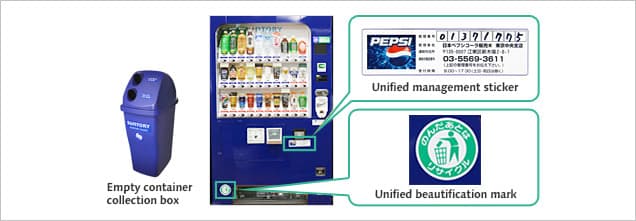
Placing Industry-Standard Recycling Bins with New Functions Next to Vending Machines
Starting in the fall of 2022, the Suntory Group has begun gradually rolling out recycling bins with industry-standard specifications in outdoor areas where there is a lot of discarded waste. New recycling bins with innovations such as a downward-facing insertion slot have been shown to reduce the amount of non-recyclable trash put into them. The Group is focusing on collecting used PET bottles from vending machines to promote horizontal recycling. In addition, improving the quality of the empty soft drink containers collected will improve efficiency for vending machine operators and recycling processes and promote PET bottle resource circularity. The Suntory Group will continue to utilize the recycling bins next to vending machines as a gateway to resource recycling, and raise awareness that these bins are not waste bins but recycling bins.

